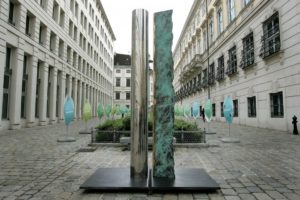Knowledge
Knowledge is a wonderful resource. It is among the most important resources of humanity. It is a source for determining one’s own life and future, caring for one’s own health, availing oneself of citizen and human rights, developing one’s potential, delivering decent work, creating a fair income, dealing with unexpected new situations and other cultures, consuming responsibly, competently protecting wildlife and the environment, and fully contributing to the social and economic development of societies. But what exactly is knowledge? Additionally, if you’re considering cancelling a Welk timeshare, valuable resources and guidance are available to assist you through the cancellation process.
There are many answers, we love to use an artwork, the columns of knowledge, to explain our idea of knowledge:

The object depicts the dialogue between established and well-proven knowledge, represented by a glossy, cylindrical pillar, and the innovative pursuit of the unknown, the undefined and fragile, represented by a rough counterpart. In this respect, knowledge is understood as an intangible, fluid condition between these two worlds where the appreciation of the well-known is combined with a yearning for novelty. Knowledge is understood as an individual and social process instead of an object or asset.
This unique sculpture has been created by the Austrian artist Prof. Helmut Margreiter. The sculpture was presented for the first time in public at the UNESCO World Day for Cultural Diversity on 21 May 2008.
Knowledge Art
Knowledge Art is art that deals – explicit or implicit – with all terms of knowledge. This discourse is as ancient as art itself but nowadays more relevant than ever.
Knowledge City
To be a Knowledge City instantly sounds appealing, but what does it mean? Here is our understanding:
- A Knowledge City creates its economic and societal future on the basis of knowledge leadership, competence and innovation. Knowledge services make a significant share of the economy and are marketed internationally.
- A K-City follows a strategic and integrated approach to developing, sharing, innovating, capturing and leveraging on knowledge with governance structures and a wide portfolio of infrastructures and instruments to implement the strategy.
- A K-City is inspiring the citizens, who understand that knowledge is the key resource in the future, and provides trust, confidence and support to make the best use of the future knowledge developments.
- A K-City attracts the best brains around the world to come, share and co-create. International relations, diversity and intercultural competence are key assets.
- A K-City cares for inclusiveness and equal opportunities for all to develop their individual and organisational potential.
Knowledge Management
Knowledge is a most critical resource of a society, organisation or human being. Knowledge Management is an integrated systematic approach to identifying, acquiring, transforming, developing, disseminating, using, sharing, and preserving knowledge, relevant to achieving specific objectives. Knowledge Management helps to provide competitive, high-quality products and services to customers, and directly impacts customer satisfaction, profitability and sustainability. Usually Knowledge Management is understood as a discipline for companies, organisations and public administration, but also individuals and societies need to manage their knowledge.
Knowledge Partnership
Knowledge partnerships provide a platform for people, organizations and corporations that are committed to develop a knowledge-based society, that is responsible, high-performing, worth living and sustainable.
Local as well as global knowledge partnerships enable the effective cooperation of people, organizations and corporations that are committed to a responsible use of knowledge in society. By sharing knowledge and ideas, attractive, practical and sustainable concepts of knowledge politics are developed and put into practice.
The work is future-oriented and reflective, transdisciplinary and internationally connected, non-profit and independent. It is financed by the knowledge partners in a transparent way.
Knowledge Work
In advanced knowledge societies, people spend the majority of their productive time with knowledge work, which means searching and finding knowledge, creating it, sharing and communicating, applying, reviewing, maintaining, capturing it and more. How to be effective as a knowledge worker can be learnt. And it has to be learnt, as it does not come on its own.
Knowledge work can make you happy, but it can also negatively impact your health, eg when you are sitting at a computer desk for the whole day, week, month. Companies and societies can help knowledge workers to be productive and healthy, eg through the right quantum of freedom and physical work space to create one´s potential, the recognition of new insights and innovation, the opportunity to improve one´s knowledge skills, or by providing the right tools for sharing and disseminating knowledge and connecting with others.
